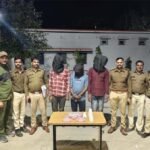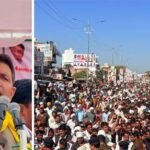United Nations, May 6 (UNI) The issue of escalating India-Pakistan tensions was discussed with concern at a closed-door meeting of the UN Security Council (UNSC) where Islamabad was asked tough questions, including about the role of the Lashkar-e-Taiba (LeT) terror group in the Pahalgam attack, sources said.
The issue was taken up by the UNSC on Monday at the behest of Pakistan whose claim about the Pahalgam terror attack being a “false flag” operation by India was not accepted, the sources said.
Pakistan is currently a Non-Permanent Member of the UNSC since January 1 this year. The UNSC has five Permanent Members with Veto Power and 10 Non-Permanent Members, who are elected for a two-year term, with five seats changing every year.
No statement was issued after the meeting as is the norm regarding the “informal” sessions.
At the ‘informal meeting’ of the world body, “there was broad condemnation of the terrorist attack and recognition of the need for accountability,” a source said about the April 22 carnage in Baisaran area of Pahalgam in Kashmir in which 25 tourists and a local man were gunned down in cold blood.
“Some members specifically brought up the issue of targeting tourists on the basis of their religious faith,” the source said.
While condemning the act of terrorism in Pahalgam, the UNSC members posed “tough questions” to Pakistan.
“They refused to accept the false flag narrative by Pakistan and asked whether the LeT was likely to be involved,” the source said.
The UNSC members also criticised Pakistan’s escalatory missile tests and nuclear rhetoric and asked Islamabad to resolve issues with India bilaterally, the sources added.
“Many members expressed concern that Pakistan’s missile tests and nuclear rhetoric were escalatory factors. Pakistan’s efforts to internationalise the situation also failed. They were advised to resolve issues bilaterally with India,” the sources said.
Notably, Pakistan has test-fired two ballistic missiles in the past one week, and its Information Minister as well as Defence Minister have been issuing inflammatory statements, that Islamabad would use Nuclear weapons in case of a war with India.
Tensions began to escalate after the ghastly terror attack in Pahalgam as The Resistance Front (TRF), a frontal outfit for Pakistan-based LeT, issued a statement, claiming responsibility for the act. However, days later, it retracted, saying the earlier statement was issued by mistake.
India, which vowed to punish the perpetrators of the heinous act as well as their masters across the border, has since taken certain punitive steps against Pakistan, like suspending the 1960 Indus Water Treaty, shutting down the Attari-Wagah border transition point, shutting down airspace and disallowing access to Pakistani ships at Indian ports.
Suspension of trade, snapping of postal links and downsizing of diplomatic staff in the Missions in Delhi and Islamabad are the other steps taken.
Pakistan too has taken certain “retaliatory” actions, like suspending the 1972 Simla Agreement and shutting its airspace for Indian flights.











